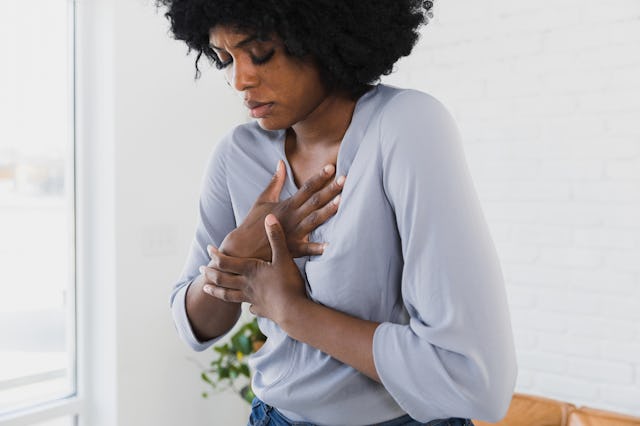Can Chest Pain Be Muscular? How To Tell If You’re Dealing With A Strain Or Something More
A few expert pointers to suss out which unsettling twinges to worry about.

When we think of chest pain, we typically think of a heart attack — and that's pretty scary (obviously). But sometimes, chest pain is just a sign that you worked out a little too hard. Or maybe you toted your 9-year-old around, even though you know they've outgrown the carrying phrase. Confusing the matter even more? Muscular chest pain can feel like a heart attack. So, if you tend to panic over every twinge or ache, you're probably freaking out over how to tell if chest pain is muscular... or a sign of something more serious.
While it can be difficult to suss out the difference between the two (especially when you're in panic mode), there are some signs to look for to help reassure you that it likely isn't a heart attack. To point you in the right direction, Scary Mommy tapped Dr. Daniel Boyer of Farr Institute and Christine Kingsley, an advanced practice registered nurse (APRN) of the Lung Institute, for more information.
Keep reading to discover the typical signs of chest pain caused by a muscular injury.
How does muscular chest pain feel?
"Chest pain caused by muscular injury can feel sharp, stabbing, gnawing, or burning," explains Dr. Boyer. "It may come and go or be constant. It can radiate (move) to your arms, jaw, back, or abdomen."
What are some signs of a chest muscle strain?
"Chest muscle strain produces sharp or dull pains that are localized in the pectoral muscles," Kingsley says. "The pain can be more pronounced with deep inhales and exhales, and in some cases accompanied by swelling, bruising, and muscle spasms."
Adds Boyer: "Chest pain caused by muscular injury is usually localized on the left side of your chest. With a more severe condition, like a heart attack, the pain can be all over your upper body and stomach."
Other signs, says Boyer, include:
- Pain or tightness in the chest.
- Tightness in the back and shoulders.
- Swelling and inflammation in the muscle or surrounding tissues.
- Shortness of breath.
- Feeling faint or dizzy.
- Difficulty breathing (dyspnea).
So, what's the best way to be sure if it is a chest injury? According to Kingsley, be on the lookout for increased pain after applying pressure on your chest cavity.
How do chest muscle strains typically happen?
According to Kingsley, pulling a chest muscle can be caused by something as arduous as heavy lifting without adequate warm-up or something as mundane as moving furniture. People who suffer from bronchitis are also at high risk of pulling a chest muscle since their condition triggers chronic, hard coughing, which injures and inflames chest muscles.
Other causes, Kingsley says, include contact sports and athletics involving powerful and/or repetitive upper body motions. Tennis, golf, and rowing are all excellent examples of chest muscle-straining physical activities.
How do you alleviate muscular chest pain at home?
"Alleviating chest muscle pain requires tricks no different from that used for addressing any other pain in the body's muscles — rest and cold," Kingsley says. "It's critical not to further exacerbate the strain by executing hardcore physical tasks. The body must be rested and iced via cold compress to numb the area and send brain signals that suppress the pain."
If there's swelling, Kingsley recommends compressing the area with an elastic bandage, which can help soothe the chest muscles. The wrap should not hinder circulation, she cautions, as that would cause the pain to increase.
What's the difference between muscular chest pain and a heart attack?
"A heart attack causes extreme fatigue, dizziness, and sweating," Boyer explains. "However, it's important to remember that not only women are prone to this condition, but men can also experience it." If you don't have any other symptoms, including vomiting and shortness of breath, Boyer says muscular injury-related chest pain is generally milder than that for something more serious.
Additionally, Kingsley emphasizes that chest pain due to pulled muscles should not last for more than a week or keep you immobilized. She advises it's always a good idea to visit the doctor's office any time you feel there's something wrong with your body: “Especially since chest muscle pain can sometimes be difficult to separate from heart-related issues, getting checked by healthcare professionals is the safest route."
This article was originally published on